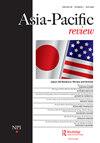The Evolution of Japanese Perceptions of China since 1945
IF 0.5
Q4 INTERNATIONAL RELATIONS
引用次数: 0
Abstract
AbstractThis essay is an examination of how Japanese perceptions of China have changed over time, paying particular attention to issues of political economy. It will examine relations both before and after the 1972 normalization of relations between the two countries. Notes1 “Heiwa nihon juritsu no hōkō: honsha yoron chōsa; 8.8 wari sensō nozomazu; eisei chūritsu wo attōteki shiji [Towards the Establishment of a Peaceful Japan: Our Opinion Survey; 88% do not wish for war, overwhelming support for permanent neutrality],” Yomiuri Shimbun, August 15, 1949.2 “Tai bei kankei, Anpo mondai: honsha yoron chōsa [Relations with the United States, the Security Treaty Issue: Mainichi Opinion Polls],” Mainichi Shimbun, Jauly 1, 1968.3 “Kyosantō wo dō omou, honsha yoron chōsa 87% ga kenokan idaku, Kokufu shiji tsuyomaru 44% [What do you think of the communist party? Yomiuri Opinion Survey: 87% dislike, support for the Kuomintang government increases to 44%],” Yomiuri Shimbun, February 18, 1952.4 “Gaikō seisaku wa dō suru beki ka, Honsha yoron chōsa: Seifu no seisaku to kōsō [What should our foreign policy be? Mainichi Opinion Polls: Government Policy and Ideas”), Mainichi Shimbun, June 24, 1953.5 “Tōzai kyozon to keizai mondai: Honsha zenkoku yoron chōsa. ‘Chūso tsūshō’ ni rakkan ron [The coexistence of the East and West and Economic Issues: Yomiuri Nationwide Opinion Survey; ‘China/Soviet Businessmen’ are optimistic”), Yomiuri Shimbun, December 29, 1954.6 Inoue Masaya, “Yoshida Shigeru no Chūgoku ‘gyaku shintō’—Tai Chūgoku interijensu wo megutte, 1952-1954 [Yoshida Shigeru’s ‘Reverse Penetration’ Vision for China—Discussing intelligence on China, 1952-1954],” Kokusai seiji, no. 151, March 2008.7 “Kishi naikaku no gaikō wo dō miru: Honsha zenkoku yoron chōsa. Tai Bei kyōchō wo zenin 64% [What do you think of the Kishi Cabinet’s foreign policy? Yomiuri Nationwide Opinion Survey. 64% approve of cooperation with the United States],” Yomiuri Shimbun, September 16, 1957.8 “Kaku jikken wa mō gomen: Uragirareta Nihon no negai/Chūgoku kaku jikken [No more nuclear tests: A betrayal of Japan’s plea/Chinese nuclear test],” Yomiuri Shimbun, October 17, 1964.9 “Nicchū, 64% kokkō nozomu. Taiwan to danzetsu, hantai ga ōi. Seiji [Japan-China, 64% want diplomatic relations. Most oppose ending relations with Taiwan. Politics],” Mainichi Shimbun, June 23, 1970.10 “Gunkoku shugi: Nicchū mondai. Nakayoku shitai kuni: Honsha yoron chōsa ‘Kurashi to seiji ishiki’ [Militarism: Japan-China Issues. Countries to get along with: Mainichi Opinion Polls, ‘Life and Political Consciousness’],” Mainichi Shimbun, January 3, 1972.11 “Ichiban shitashiku suru kuni. Bei oi Chūgoku 23%: Bōei Mondai (Honsha yoron chōsa) [Friendliest country. China close behind America at 23%: Defense Issues Mainichi Opinion Polls],” Mainichi Shimbun, November 1, 1978.12 “Gaikō ni kansuru yoron chōsa ichiran [Summary of Public Opinion Polls on Foreign Relations],” Cabinet Office website, https://survey.gov-online.go.jp/index-gai.html.13 “Dai 18 kai Nicchū kyodō yoron chōsa (2022) kekka [Results from the 18th joint Japan-China Public Opinion Survey (2022)],” Genron NPO website, November 30, 2022, https://www.genron-npo.net/world/archives/13950.html.14 “Negative Views of China Tied to Critical Views of Its Policies on Human Rights,” Pew Research Center, June 29, 2022, https://www.pewresearch.org/global/2022/06/29/negative-views-of-china-tied-to-critical-views-of-its-policies-on-human-rights/.15 “Gaikō ni kansuru yoron chōsa ichiran [Summary of Public Opinion Polls on Foreign Relations],” Cabinet Office website, https://survey.gov-online.go.jp/index-gai.html.Additional informationNotes on contributorsKawashima ShinKawashima Shin is Professor, Department of International Relations, the Graduate School of Arts & Sciences, the University of Tokyo. Previously he was associate professor at Hokkaido University (1998-2006) and the University of Tokyo (2006-2015). He earned academic degrees at the Tokyo University of Foreign Studies (B.A.1992) and the University of Tokyo (Oriental history, M.A., 1994 and Ph. D., 2000).Other posts include Senior Fellow in the National Security Agency (2014-2018), and an associate member of the Science Council of Japan (2014 to present).He was engaged in education and research at Institute of Modern History, Academia Sinica (Taipei), Beijing Center for Japanese Studies, Peking University, National Chengchi University (Taipei), and Woodrow Wilson International Center for Scholars. His research covers Chinese/Taiwanese diplomatic history and the contemporary international relations in East Asia. He has authored and edited several books and numerous articles, notably Formation of Chinese Modern Diplomacy (Nagoya University Press, 2004, awarded the Suntory Academic Prize), and China in the 21st Century (Chuokoron-shinsha, 2016).He joined NPI as a Senior Fellow in 2010 and became Executive Director of Research at NPI in 2022.1945年以来日本对华观念的演变
摘要本文考察了日本人对中国的看法是如何随着时间的推移而变化的,并特别关注了政治经济问题。它将审查1972年两国关系正常化之前和之后的关系。注1“平和日本juritsu no hōkō;本州yoron chōsa;8.8 wari sensse nozomazu;卫成chūritsu wo attōteki[走向建立和平日本:我们的意见调查]88%的人不希望战争,绝大多数人支持永久中立],《读卖新闻》,1949年8月15日;《台北经济新闻》,《安波星期一》:honsha yoron chōsa[与美国的关系,安全条约问题:每日新闻的民意调查],《每日新闻》,1968年7月1日];《kyosanthi wo domou, honsha yoron chōsa》87% ga kenokan idaku, Kokufu shiji tsuyomaru 44%[你对共产党的看法?读卖民意调查:87%不喜欢国民党政府,支持率上升至44%,《读卖新闻》1952年2月18日,“gaikkseisaku wa du suru beki ka, Honsha yoron chōsa: Seifu no seisaku to kōsō[我们的外交政策应该是什么?《每日民意调查:政府的政策和想法》),《每日新闻》,1956.24,3.5“Tōzai共同经济星期一:本州zenkoku yoron chōsa”。“Chūso tsūshō”ni rakkan ron[东西方共存与经济问题-读卖新闻全国民意调查;“中国/苏联商人”是乐观的”,读卖新闻,1954年12月29日。井上雅也,“吉田茂不Chūgoku‘gyaku shintu’-Tai Chūgoku interijensu wo megutte, 1952-1954[吉田茂对中国的‘反向渗透’设想——讨论中国情报,1952-1954],”《国斋精刊》,第2期。151, 2008年3月8日“岸奈加没有gaikki - wo - d - miru: Honsha zenkoku yoron chōsa”。台北kyōchō wo zenin 64%[您如何看待岸信介内阁的外交政策?读卖全国民意调查。64%赞成与美国合作],《读卖新闻》,1957.7.8“Kaku jikken wa mgi gomen: Uragirareta Nihon no negai/Chūgoku Kaku jikken[不再核试验:对日本请求的背叛/中国核试验]”,《读卖新闻》,1966.17“nicchya, 64% kokkki nozomu”。台湾到丹泽祖,韩泰伽ōi。64%的人希望建立外交关系。大多数人反对与台湾断交。[政治],《每日新闻》1970.10年6月23日。Nakayoku shitai kuni: Honsha yoron chōsa“Kurashi to seiji ishiki”[军国主义:日中问题]。要与之相处的国家:《每日新闻》民意调查,“生活与政治意识”],《每日新闻》1972.11年1月3日。北伊Chūgoku 23%: Bōei星期一(Honsha yoron chōsa)[最友好的国家。中国紧随美国,占23%。《防务问题每日民意调查》,《每日新闻》1978.12《对外关系民意调查摘要》,内阁府网站https://survey.gov-online.go.jp/index-gai.html.13《第18次日中联合民意调查(2022)结果》chōsa (2022),Genron NPO网站,2022年11月30日https://www.genron-npo.net/world/archives/13950.html.14“对中国的负面看法与对其人权政策的批评联系在一起”,皮尤研究中心,2022年6月29日,https://www.pewresearch.org/global/2022/06/29/negative-views-of-china-tied-to-critical-views-of-its-policies-on-human-rights/.15“对外关系民意调查摘要”,内阁府网站https://survey.gov-online.go.jp/index-gai.html.Additional信息川岛信作者川岛信是东京大学文理研究生院国际关系系教授。此前,他曾在北海道大学(1998-2006)和东京大学(2006-2015)担任副教授。他先后在东京外国语大学(1992年获得学士学位)和东京大学(1994年获得东方史硕士学位,2000年获得博士学位)获得学位。其他职位包括国家安全局高级研究员(2014-2018),日本科学委员会准成员(2014年至今)。曾在台北中央研究院近代史研究所、北京大学北京日本研究中心、国立政治大学台北分校、伍德罗·威尔逊国际学者中心从事教育和研究工作。他的研究领域包括中国/台湾外交史和当代东亚国际关系。著有《中国现代外交的形成》(名古屋大学出版社,2004年,获三得利学术奖)、《21世纪的中国》(中央书社,2016年)等多部专著和多篇文章。他于2010年加入NPI担任高级研究员,并于2022年成为NPI的研究执行董事。
本文章由计算机程序翻译,如有差异,请以英文原文为准。
求助全文
约1分钟内获得全文
求助全文

 求助内容:
求助内容: 应助结果提醒方式:
应助结果提醒方式:


